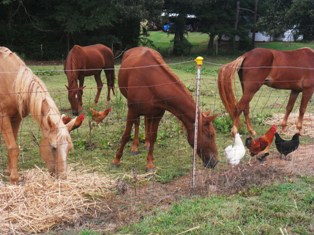Known as nature’s tractors, a chicken’s favourite pastime is scratching in loose litter looking for worms and little bits of grain that have dropped out of hay or feed.
Chickens will also clean through stable bedding, which means that horses are not continuing to pick over the same places ingesting dirt that could potentially cause colic, however, the biggest benefit to horse owners is the constant noise and movement around their horses’ legs.
Chickens chase each other, fight over morsels of food they have found and call their chicks in to eat. Roosters cause ruckuses in the flock chasing hens and this also means lots of noise and movement.

This continual movement and regular sudden outbursts of noise and flapping teaches horses to become more tolerant of the unexpected. A leaf blowing across the arena, or a bird taking off in the bushes no longer causes a fearful reaction as it is nothing compared to what they are used to from the chickens around their feet.
There are many stories of horses forming friendships with chickens; horses that wait for their friends to roost on the stable door for the night before settling down, hens that sleep on horses’ backs and pairs that wander the paddock together throughout the day.
Sometimes a hen will realise that there are better pickings in the feed bins but horses get so used to them that a sideways swipe with the head usually puts her back where she belongs on ground level. There can be the occasional accident, when young foals decide chickens are good to chase, but they will learn to wait until the horse is far enough away, on the other side of the yard, before running quickly across. After a while the foals seem to get bored with them and before long they are eating round their feet as well.
It is a must to keep water containers full or provide a safe island inside the container. Chickens sit on the edge to drink and if the water level is low they may fall in and can die from hypothermia if not rescued quickly enough.
It is also best practice not to let the chickens roost where the horse feed is kept or let horses, particularly foals, graze on paddocks with very heavy levels of chicken manure as there is the possibility of salmonella bacteria in the chicken manure infecting the more vulnerable young horses.
Chicken feed needs to be kept safely away from inquisitive horses as it is not suitable for them to eat and for horse owners who live in stable fly or ‘biting fly’ areas it is important to ensure that piles of chicken manure, such as from cleaning out the coop, are not left uncovered for flies to breed in.
With such a wide variety of chickens available on the market it is easy to select the type most suited to each situation. There are many choices of temperaments, colours, feathers and looks. Smaller chickens, such as bantams, scratch smaller areas and dig smaller holes. Other breeds are prolific egg layers and yet some are renowned for their quick growth, which makes them popular in the meat industry.
Another great bonus of keeping chickens in the stables is the beautiful fresh eggs. Feeding horses eggs is an old tradition, used by many horse owners and breeders for centuries. Eggs are a source of protein and provide a shine to the coat. A raw egg can be mixed through a horse’s feed daily and not only that, they are good for breakfast.



